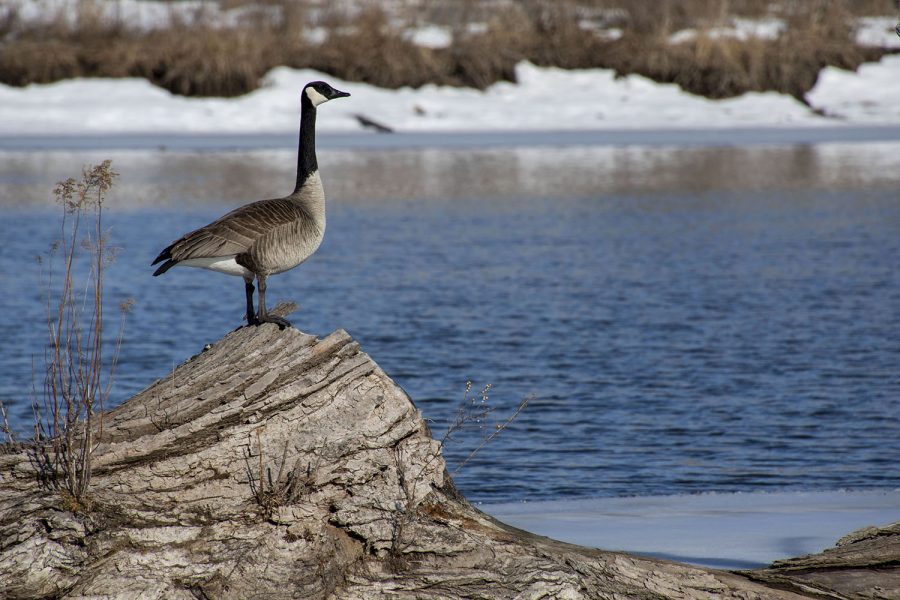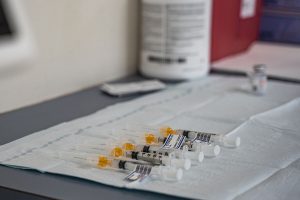Dead geese in Iowa River may have suffered from neurological disease
Geese in Iowa City are dying due to a disease that is believed to be caused by a change in diet, which is restricting access to glucose in their brains.
Geese take advantage of the sunshine just above the Iowa River Power Dam on March,1 2021.
March 2, 2021
Geese in Iowa City have been found sick and dead along the Iowa river over the past week. Birdwatchers first posted about these geese on Facebook, drawing attention from the Iowa Bird Rehabilitation and the Iowa Department of Natural Resources.
State Wildlife Veterinarian at the Iowa Department of Natural Resources Rachel Ruden said the first people to report the sick geese on Facebook said they noticed the geese behaving strangely, unable to walk or fly away.
Ruden said these symptoms are called stargazing and torticollis.
“Stargazing is when they are looking off into the distance, and not reacting appropriately to things like a person approaching them,” Ruden said. “Torticollis means a bend in the neck. Plenty of videos shared on social media of these geese looking up and then falling onto their backs, and not holding their necks appropriately.”
There are no exact numbers on how many geese have died from these symptoms, but Ruden said that there were close to 100 observed postmortems, most of which washed downstream of the Iowa River.
After some testing, Ruden said the Iowa Department of Natural Resources believed the cause of the disease was most likely dietary in nature.
Because of the heavy snowfall that Iowa City received in the past few weeks, she said the geese were not able to access their main food source, which is primarily grasses and seeds.
Because of this, she said Canada geese went to where the Iowa river wasn’t frozen and mainly fed on Shad, a freshwater fish, which contains an enzyme called thiaminase.
“This is a protein that breaks down thiamine, which is vitamin B1. This vitamin is necessary for glucose metabolism in the brain,” Ruden said. “So, when the brain can’t get to that glucose store, you start seeing those kinds of neurologic signs.”
As more attention was brought to the issue, groups like Iowa City Animal Care and Adoption Center, as well as Iowa Bird Rehabilitation, began to take sick geese into their care.
CEO and founder of Iowa Bird Rehabilitation Jenni Boonjakuakul said the rehabilitation center began to receive the sick geese from the Iowa City and Coralville area.
“Two of our volunteers drove up to Coralville to help them, collect the geese, and then transport them back to us,” Boonjakuakul said. “By Monday, we had received nine more and had a total of 52 in our care.”
When the geese were provided with a water-soluble thiamine supplement in rehabilitation, they responded well and began to recover, Boonjakuakul said.
“I would say within 24 to 48 hours we were already seeing a really big improvement with some of the geese,” Boonjakuakul said. “So, we just kind of stuck with that treatment protocol until we could find out the cause for sure.”
Many of the geese that were taken in for rehabilitation and study have recovered fully or are on the way to becoming fully healthy again, she said.
“I would say about 75 to 80 percent of them are actually doing great,” Boonjakuakul said. “Twenty to 25 percent of them are still showing some neurological signs but are improving, so I am hopeful that they’re going to make a full recovery.”
Iowa City Animal Coordinator Chris Whitmore at the Iowa City Animal Care and Adoption Center said, while this event is naturally occurring, people should do what they can to help out.
“It’s unfortunately a cruel world, and Mother Nature can be cruel as well,” Whitmore said. “But we really need to figure out what it was for sure, so that we can make sure that other animals aren’t going to get infected as well.”






